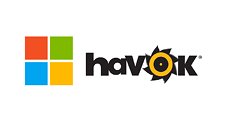Raevenlord
News Editor
- Joined
- Aug 12, 2016
- Messages
- 3,755 (1.20/day)
- Location
- Portugal
| System Name | The Ryzening |
|---|---|
| Processor | AMD Ryzen 9 5900X |
| Motherboard | MSI X570 MAG TOMAHAWK |
| Cooling | Lian Li Galahad 360mm AIO |
| Memory | 32 GB G.Skill Trident Z F4-3733 (4x 8 GB) |
| Video Card(s) | Gigabyte RTX 3070 Ti |
| Storage | Boot: Transcend MTE220S 2TB, Kintson A2000 1TB, Seagate Firewolf Pro 14 TB |
| Display(s) | Acer Nitro VG270UP (1440p 144 Hz IPS) |
| Case | Lian Li O11DX Dynamic White |
| Audio Device(s) | iFi Audio Zen DAC |
| Power Supply | Seasonic Focus+ 750 W |
| Mouse | Cooler Master Masterkeys Lite L |
| Keyboard | Cooler Master Masterkeys Lite L |
| Software | Windows 10 x64 |
As you might recall, Microsoft bought HAVOK from Intel back in 2015, promising to "add Havok's IP to its existing tools and platforms, including DirectX 12, Visual Studio, and Azure." Well, it would seem we are seeing the fruits of that particular seeding, with Microsoft having trademarked "Direct Physics".
With Microsoft having previously talked about integrating HAVOK with its DX12 API, that is probably the most probable scenario for this trademark. A tighter, in-DX12 integration could possibly allow for the physics workflow to have increased performance under the API, which is something we can all get behind of. However, this also begs the question as to what exactly happens to HAVOK licensing in the process. I myself wouldn't expect Microsoft to put its HAVOK tools and libraries behind a DX12 implementation wall - the number of companies who license those libraries aren't few in number. So my guess is that Microsoft is simply rebranding the HAVOK middleware for integration under its DX12 API, which could mean opening up its libraries to any game that makes use of DX12.

This is where things get interesting, because this would allow would-be licensees of HAVOK to take one of two paths for acquiring the tool-kits and workflows on the physics middleware: either license it, or get it for free by developing their games under DX12. If so, and I would wager this is the scenario playing out at Microsoft, the company can still monetize its HAVOK IP to anyone who doesn't want to implement DX12, while at the same time, increase the likelihood of developers adopting DX 12 as their development API of choice. This would naturally help Microsoft in gaining the upper hand against Vulkan - arguably the better choice from a developer's perspective due to its greater cross-platform flexibility. At the same time, Microsoft could ensure more games are developed under its poster-child and ecosystem-foundation (both in consoles and PCs) DX12.
As a reminder, many high-profile games make use of the HAVOK libraries and workflows, such as 343 Industries' Halo 5: Guardians, Bungie's Destiny, and more recently, Nintendo's The Legend of Zelda: Breath of the Wild, just to name a few.



View at TechPowerUp Main Site
With Microsoft having previously talked about integrating HAVOK with its DX12 API, that is probably the most probable scenario for this trademark. A tighter, in-DX12 integration could possibly allow for the physics workflow to have increased performance under the API, which is something we can all get behind of. However, this also begs the question as to what exactly happens to HAVOK licensing in the process. I myself wouldn't expect Microsoft to put its HAVOK tools and libraries behind a DX12 implementation wall - the number of companies who license those libraries aren't few in number. So my guess is that Microsoft is simply rebranding the HAVOK middleware for integration under its DX12 API, which could mean opening up its libraries to any game that makes use of DX12.

This is where things get interesting, because this would allow would-be licensees of HAVOK to take one of two paths for acquiring the tool-kits and workflows on the physics middleware: either license it, or get it for free by developing their games under DX12. If so, and I would wager this is the scenario playing out at Microsoft, the company can still monetize its HAVOK IP to anyone who doesn't want to implement DX12, while at the same time, increase the likelihood of developers adopting DX 12 as their development API of choice. This would naturally help Microsoft in gaining the upper hand against Vulkan - arguably the better choice from a developer's perspective due to its greater cross-platform flexibility. At the same time, Microsoft could ensure more games are developed under its poster-child and ecosystem-foundation (both in consoles and PCs) DX12.
As a reminder, many high-profile games make use of the HAVOK libraries and workflows, such as 343 Industries' Halo 5: Guardians, Bungie's Destiny, and more recently, Nintendo's The Legend of Zelda: Breath of the Wild, just to name a few.



View at TechPowerUp Main Site
Last edited:




 Oh and you're not alone with wanting that ending
Oh and you're not alone with wanting that ending